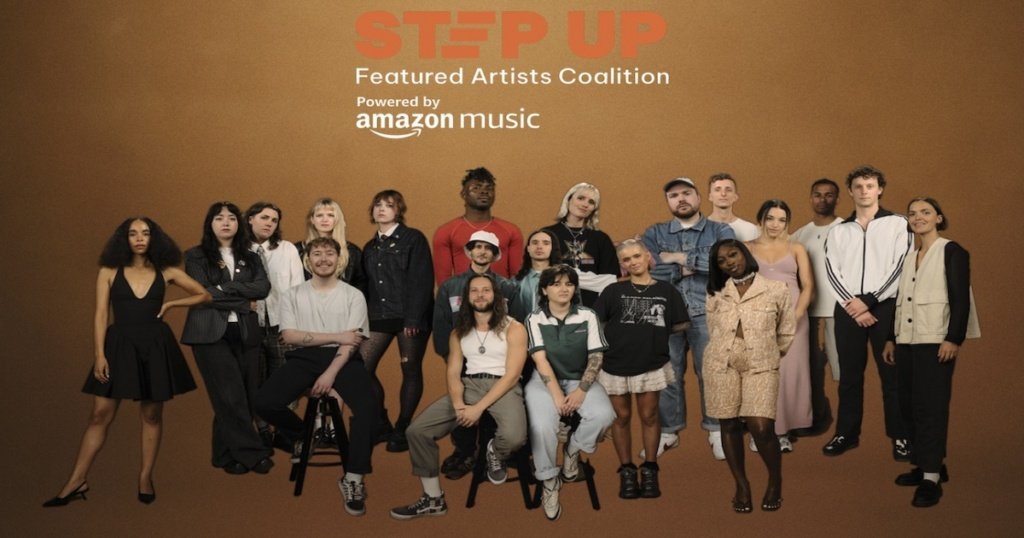Featured Artists Coalition (FAC) CEO David Martin has spoken to Music Week about the challenges for UK exports and the need to support emerging artists.
The FAC recently renewed its partnership with Amazon Music on the Step Up Fund. Now entering its fourth year, Step Up has provided grants totalling £250,000 to over 30 UK bands and solo artists across various genres – helping them pay for new recordings, underwrite the costs of live touring, as well as marketing, PR, video making and other content creation.
The 2025 line-up is set to be announced in the weeks ahead. Last year’s recipients included Azekel, Beka, Blair Davie, Unpeople, Hana Lili, Lime Garden, Olive Jones, ShaSimone, Sofy and Dirty Nice.
While the FAC initiative is targeted at emerging talent, chief exec David Martin also went public recently with his concerns about UK music exports. Giving evidence at the Culture, Media & Sport Committee in parliament on grassroots music, he highlighted to MPs the absence of UK talent on Spotify Wrapped’s rankings last year – an issue raised by Music Week.
There’s also been a wave of US artists – superstars and new acts – dominating UK charts, including Alex Warren, Sabrina Carpenter, Chappell Roan, Kendrick Lamar and Gracie Abrams.
Following our special report on the progress of UK streaming exports this year – including success stories such as Lola Young, Myles Smith, Charli XCX and Sleep Token – here David Martin gives us an FAC perspective on British talent at all levels…
During the grassroots CMS hearing, you highlighted the absence of UK talent in the Spotify Wrapped rankings. Why is it so concerning to see British acts missing from those year-end breakdowns, as well as the fairly rare appearances at the upper end of the weekly global Spotify rankings?
“Clearly, Spotify stats and chart position are not everything, however they can provide a useful snapshot of trends. The UK produces some of the world’s most culturally and artistically important music, and I believe we will continue to do so in the future. Some music is not designed to attract millions of streams, or sell tens of thousands of tickets – and that does not make it any less important. Success can be defined in a variety of different metrics, as can the concept of breaking through. Many artists operate successfully within a well-defined niche or genre.
“However, it is still important that the UK can compete on larger, mainstream platforms. Those metrics often indicate the overall health of the UK’s wider music industry and reflect what is happening across the sector. We can’t rely on our illustrious history, especially when the dynamics of streaming have ramped up global competition. We see first-hand that the talent and artistry is abundant in the UK, but we need to ensure we create an environment that allows it to thrive at the level it should.”
Talent and artistry is abundant in the UK, but we need to ensure we create an environment that allows it to thrive
David Martin
UK artists face increasing competition from international talent. Are there any steps that could be taken to improve the position of recorded music exports?
“Undoubtedly, Brexit has presented the most damaging barrier to international success. In most cases, the success of an artist’s recorded music is symbiotic with their live performances. The two go hand-in-hand and feed off each other. If it’s prohibitive for UK artists to access and travel into Europe – our most significant international market by some distance – then it stands to reason that it will be more challenging to build and consolidate their audience.
“Spotify revealed that over 75% of UK artists’ royalties are coming from international streams. Our fear is that Brexit has disadvantaged UK artists to tour internationally at the exact moment that the dynamics of streaming are opening up new global markets. Add to that the cost-of-touring crisis at home, and sustaining a career becomes far more precarious.”
How do you feel the UK is doing in terms of breaking new acts now who could have global potential? What are the barriers to breakthroughs?
“Considering the challenges of Brexit, and considering the disrupting impact of the pandemic, I think UK artists have fared pretty well. It also depends on the interpretation of ‘breaking’. In terms of the mainstream Top 40, there’s clearly been a downturn. The higher echelons of our charts have been dominated by US superstars, while UK artists are benefitting less from the trend for ‘glocalisation’. We’re still doing okay, the UK still accounts for 10% of all global streams – although that’s fallen dramatically from 10 years ago.
“I also think if you look at the European festivals this year, the UK influence is clearly really strong. If you look at an event like Roskilde in Denmark, for example, you had appearances from everyone from Charli XCX and Stormzy to FKA Twigs, Jamie xx, AG Cook, Beth Gibbons, FLO, Rachel Chinouriri, Wet Leg, Alabaster Deplume, Fabiana Palladino, Geordie Greep, Jasmine.4.T, Moin, Lambrini Girls and Lola Young. That’s a pretty amazing statement of where the UK is creatively right now, and it should be grounds for optimism.
“However, we’ve got to ensure that the next generation of talent can follow and build in their footsteps. That’s one of the reasons why myself and [Wolf Alice’s] Joff Oddie were in Parliament [at the grassroots hearing], and why the FAC has been at the heart of discussions around the levy on arena and stadium shows to support grassroots touring. As a result of those discussions, I think there’s now a dawning realisation of how much the wider industry relies upon artists. Not only creatively, but also in how much of the live supply chain is dependent upon artist investment. If artists can’t afford to pay crew or travel around the country, then everything else grinds to a halt.”
Creatively, I don’t think the UK has a problem – we’re a cultural powerhouse
David Martin
What would the FAC like to see happen to help the next generation of developing talent? How is the Step Up Fund helping to boost new artists?
“Our experience with Step Up over the past three years has shown us a number of things. First, there’s no shortage of talent in the UK – we’re inundated with applications from talented artists of every conceivable genre, and they have steadily increased. Second, despite the incredible support and generosity of Amazon Music, we can’t possibly meet that demand. Third, there’s still a real need for this kind of early-stage investment to propel artists forward and help them deliver the kind of high-quality music, video or live performances from which you can build.
“The dividends of this approach are pretty obvious with Step Up, with so many of the awardees signing label or publishing deals, or progressing to bigger stages. For instance, Sofy, who received funding last year, recently sold out a show at the Scala, Aziya is now a key focus for Warner Music globally and Amie Blu is lighting up stages wherever she goes, now backed by 2027 Def Jam, just to name a few examples.”
Finally, are there encouraging global developments at the top of the market with the impact of Lola Young, Raye and Charli XCX? Can the return of Ed Sheeran help to deliver a turnaround in global streaming rankings for the UK?
“It doesn’t take much for one or two superstar artists to shift the global streaming rankings. Obviously a hugely successful Ed Sheeran album could do that, just as Adele and One Direction have done in the past. Sleep Token were recently crowned No.1 in the US, which is a truly impressive achievement. However, I think our focus should be a little further down the pyramid. Creatively, I don’t think the UK has a problem. We’re a cultural powerhouse. If you take a step back, the outpouring of music from the UK, the depth and diversity, is incredible.
“What we need to ensure is that we’re giving artists from every genre the opportunity to reach their creative and commercial peak. Very few of those acts are going to headline Wembley, very few are going to accumulate a billion streams, but it’s that depth and diversity which is important to the long-term success of music in this country.”


